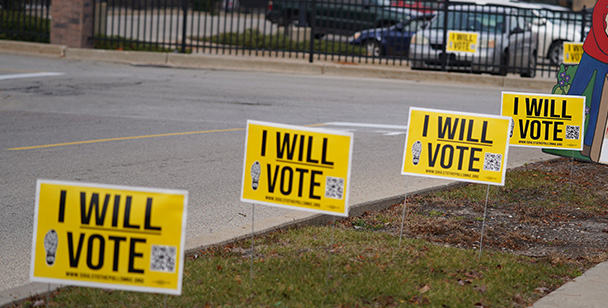 For the Greater Milwaukee Foundation, committing to build a Milwaukee for all means increasing access to opportunity in many areas of community, including participation in the democratic process.
For the Greater Milwaukee Foundation, committing to build a Milwaukee for all means increasing access to opportunity in many areas of community, including participation in the democratic process.
As the Foundation’s senior director of civic engagement, Ian Bautista recognizes that intentionally supporting nonpartisan political and civic engagement efforts such as voter participation is essential for a more equitable Milwaukee.
“In order to be the community’s foundation, we have to be responsive to the community and invest in creating more equitable power dynamics through the vote,” Bautista said. “We want to make sure that we’re sending the loud, clear signal to all of the neighbors in our neighborhoods that participation and democracy are vital and a responsibility that we all have, that we want to nurture.”
The key to success is investing in those with the experience, relationships and know-how to foster community action. Over the past year, the Foundation has awarded $100,000 in grants to seven Milwaukee-based groups to support voter registration, education and mobilization efforts. Recipients are Metcalfe Park Community Bridges, League of Women Voters Milwaukee County, Breaking Barriers Mentoring, Second Chances Staffing Services, Wisconsin Voices, Pastors United and Southside Organizing Center.
“Having the right to vote is our most powerful weapon,” Rev. Gregory Lewis said. “It’s pure power, and we just don’t believe it because there’s so much suppression: strict voter ID laws, a lack of early voting, how complex it is to register now, this drop box thing, you could just go on and on.”
Lewis is the executive director and co-founder of Pastors United and Souls to the Polls, a nonprofit that advocates for stronger voter participation and other forms of civic engagement. The group first began in 2010.
This past year, Pastors United received $22,500 from the Foundation to support its voter mobilization efforts, which include canvassing, billboards, commercials, yard signs and more. Through the support, it collaborated with community-based organizations such as Sherman Park Community Association to combat misinformation and help people realize the power of the vote.
Minority populations, individuals with disabilities and the elderly population often face multiple barriers on the way to the polls, Lewis said. Souls to the Polls works to educate people on how to stay informed and involved.
When people have the information – on candidates, referendums and the process – they can help make decisions that facilitate change and eradicate barriers. That’s a democracy, Lewis said.
Southside Organizing Center, a nonprofit known for its relational grassroots organizing and civic engagement work on the near south side, also received $22,500 from the Foundation over the course of two grant cycles and used the funding to bolster the work of its newly launched civic engagement department.
SOC has been working in the community for over 30 years.
SOC hosted virtual vote-a-thons and in-person events and canvassed door-to-door and digitally. It gathered neighbors’ questions and concerns and walked by their side throughout the year providing education on their rights, polling locations, voting options such as absentee and in-person, and more. Its current goal is to reach 25,000 people, matching the approximate number of households in the district.
“Democracy undergirds social justice,” said Tammy L. Rivera, executive director of SOC. “Voting is the power system of our nation both in setting policy/governing and allocating resources. The way you get attention is by voting and financing and demonstrating what’s important to you.”
Regardless of eligibility to vote, as a democracy, it’s important that people have the tools to express themselves to their elected officials, to hold them accountable and to educate themselves on how the system works so they can exert their influence accordingly, Bautista said.
“In order to change systems and to catalyze equitable policy change, we have to have that basic level of accountability at the ballot box with those elected officials and the appointed officials that they put in place as a result of their position of decision-making power,” he said.
Calls to action
Here are some steps you can take to ensure you’re ready for any local, state or national election.
1. Check your voter registration status.
Visit MyVote to check your registration status, find your polling place, see a sample ballot, request an absentee ballot and more. You can register to vote in person on Election Day or ahead of time via mail or online. To register, you must have a Wisconsin Driver License or Wisconsin State ID card.
2. Vote absentee in person or by mail
If you’re unable to vote on Election Day, you can vote early in person or through an absentee ballot. Request an absentee ballot to be mailed to your house or check your early person voting options at MyVote.
3. Get informed
Sample ballots are a great way to find out about who is running for national, state and local office and about statewide or local referendums. To learn about the various candidates and referendums, visit Vote411.
4. Become a poll worker
Elevate your civic engagement by becoming a poll worker. Poll workers check-in voters, register people to vote, check photo IDs and process absentee ballots. To become a poll worker, submit a request to your municipal clerk. Learn more here.